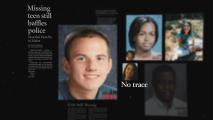Field: Computer Science
Face masks made from… LEGO?
The popular toy company that’s mass-producing PPE, how to fight the coronavirus from your computer, and more top stories in our weekly Progress Report.
Hackers leak thousands of coronavirus research papers
Potentially life-saving medical research is often hidden behind expensive paywalls, limiting access for those in the developing world. So one modern-day Robin Hood illegally downloaded and shared over 5,000 coronavirus research papers on Reddit.
Series|
Catalysts
Learning to code in prison
In partnership with Stand Together
This progressive organization is on a mission to break the cycle of recidivism, using coding. Incarcerated individuals can now spend their sentences acquiring marketable skills.
Our spare computer is helping fight coronavirus. yours can, too.
Help fight the coronavirus by donating your spare computing power to Folding@home, which will use it to run valuable protein-folding simulations.
World’s fastest supercomputer finds 77 drug candidates that could help battle COVID-19
The Summit supercomputer made quick work of complicated simulations to identify 77 compounds that could be promising COVID-19 treatments.
AI helps scientists discover powerful new antibiotic
Using a computer model powered by artificial intelligence, researchers at MIT have identified several promising candidates for powerful new antibiotics.
We’re one step closer to a super-secure quantum internet
Scientists have successfully entangled photons across a 52-mile-long quantum loop in Chicago, a major milestone along the path to a quantum Internet.
Hacking the Tinder algorithm to find love
Dating apps are really good at introducing you to lots of people, but they might not be the best way to find a lifelong partner. Can we decode our data to get better results?
Keeper of the missing
One woman is tracking thousands of missing people. Autism is her superpower.
Hackers find missing people for fun
This search and rescue expert discovered that many missing people had nobody looking for them. Then he had an idea: what if hackers made a game out of finding missing people through the internet?
An address for everywhere on Earth
Can three simple words change how we find each other?
It’s time for regular Americans to think differently about cybersecurity
If huge companies and government agencies can't manage the cyber threats, how can ordinary Americans?
The evolution of a dissident: How Ladar Levison became someone who said "no" to the FBI
For Ladar Levison, founder of secure email service Lavabit, everything changed when the two FBI agents showed up at...












